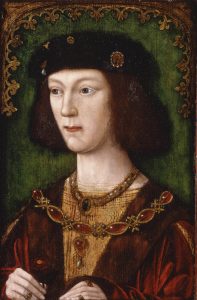 On 21st April 1509, at 11pm, King Henry VII, founder of the Tudor dynasty, died at Richmond Palace. He had ruled for over twenty-three years, since defeating Richard III and his troops at the Battle of Bosworth in August 1485. Click here to read about his death.
On 21st April 1509, at 11pm, King Henry VII, founder of the Tudor dynasty, died at Richmond Palace. He had ruled for over twenty-three years, since defeating Richard III and his troops at the Battle of Bosworth in August 1485. Click here to read about his death.
Henry VII’s death was kept secret for a couple of days and then it was announced to the Knights of the Garter on 23rd April at their annual St George’s Day Feast before being made public on 24th April. On 27th April, the Spanish envoy Gutierre Gómez de Fuensalida reported Henry VII’s death, saying: “Henry VII’s death is now public knowledge because Henry VIII is in the Tower and has proclaimed a general pardon. He has released many prisoners and arrested all those responsible for the bribery and tyranny of his father’s reign. The people are very happy and few tears are being shed for Henry VII. Instead, people are as joyful as if they had been released from prison.”1
The new king who was bringing joy to the realm was Henry VII’s seventeen-year-old son, King Henry VIII. William, Lord Mountjoy, wrote to Desiderius Erasmus, the renowned humanist and scholar, about Henry VIII’s accession:
“I have no fear, my Erasmus, but when you heard that our Prince, now Henry the Eighth, whom we may well call our Octavius, had succeeded to his father’s throne, all your melancholy left you at once. For what may you not promise yourself from a Prince, with whose extraordinary and almost divine character you are well acquainted, and to whom you are not only known but intimate, having received from him (as few others have) a letter traced with his own fingers? But when you know what a hero he now shows himself, how wisely he behaves, what a lover he is of justice and goodness, what affection he bears to the learned, I will venture to swear that you will need no wings to make you fly to behold this new and auspicious star.
Oh, my Erasmus, if you could see how all the world here is rejoicing in the possession of so great a Prince, how his life is all their desire, you could not contain your tears for joy. The heavens laugh, the earth exults, all things are full of milk, of honey and of nectar! Avarice is expelled the country. Liberality scatters wealth with bounteous hand. Our King does not desire gold or gems or precious metals, but virtue, glory, immortality […]”2
And, yes, these words are describing King Henry VIII!
As I said in my article from last year, in 1509 “Henry VIII was strapping lad of 6’3, he was handsome, he was well-educated, he was intelligent, he was charming, he was athletic, he loved music and poetry, he was a knight who loved jousting and he desired “virtue, glory [and] immortality”. It is little wonder that the people of England were “joyful” and that there was so much hope for his reign.
In a survey carried out by the Historical Writers Association (HWA) in 2015, Henry VIII was voted the worst monarch in history with words such as “obsessive”, “syphilitic” [sigh!] and a “self-indulgent wife murderer and tyrant” being used to described him.3 Yet, in the same year, author Andrew Grimson picked his “Top 11 monarchs in British history” for BBC History Magazine’s website, History Extra, and included Henry VIII in his list, explaining “although he degenerated from a Renaissance prince into a tyrant, casting off wives and servants with merciless finality, he did make England independent.”4 In 2007, in a debate for English Heritage, Alison Weir argued the case of Henry VIII being England’s greatest monarch, describing him as ” A true child of the Renaissance – a gentleman in the knightly, chivalric sense, an intellectual who read St Thomas Aquinas for pleasure, an expert linguist, a humanist, an astronomer, a world-class sportsman, a competent musician and composer, an accomplished horseman, and a knowledgeable theologian” and stating that “Henry’s true greatness lay in his practical aptitude, his acute political perception, and in the self-restraint that enabled him to confine – within limits acceptable to his people – an insatiable appetite for power.”5 You can read the rest of her argument, which includes a list of his achievements at England’s greatest monarch is…
So what do you think of Henry VIII? Was he a great king? Was he a tyrant? Were there, in fact, “two Henrys”, as David Starkey once said: the young Renaissance king and the older tyrant? Please do share your thoughts on this iconic king.
Notes and Sources
Image: Henry VIII, earliest surviving portrait, c. 1509-13, English School, Berger Collection, Denver Art Museum.
- Starkey, David (2008) Henry: Virtuous Prince, p264, citing Correspondencia de Fuensalida, 517. You can read Fuensalida’s letter in the original Spanish in Correspondencia de Gutierre Gomez de Fuensalida, embajador en Alemania, Flandes é Inglaterra (1496-1509) Publicada por el duque de Berwick y de Alba, conde de Siruela at https://archive.org/, p.515-517.
- Mumby, Frank Arthur (1913) The Youth of Henry VIII: A Narrative in Contemporary Letters. Reprint. London: Forgotten Books, 2013. p. 126-7. See http://www.forgottenbooks.com/
- Flood, Alison (2015) “Henry VIII voted worst monarch in history”, The Guardian, 2nd September 2105. See http://www.theguardian.com/
- Grimson, Andrew (2015) “Top 11 monarchs in British History”, http://www.historyextra.com/
- “England’s greatest monarch is…”, BBC News, 8 August 2007, see http://news.bbc.co.uk/